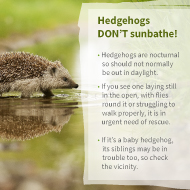
Charity issues plea to rescue struggling hedgehogs
Hedgehog experts are urging people to watch out for hedgehogs seen in daylight, as they could be in urgent need of rescue.
As hedgehogs are nocturnal, they should not normally be seen in daylight, unless their nest has been disturbed and they are relocating, or if a mother is seeking a break from the nest.
However, experts at the British Hedgehog Preservation Society (BHPS) said these hedgehogs will move quickly ‘with purpose’. Hedgehogs lying still or struggling to walk need urgent help.
Fay Vass, chief executive at the charity, said: “We frequently get calls from members of the public who have been watching a hedgehog that’s been lay still in their garden for days. By the time we get the call and the person gets the hedgehog to rescue, it’s often too late.
“Hedgehogs don’t sunbathe! If you see a hedgehog lay still in the open, or with flies round it or if it’s struggling to walk properly, it is in urgent need of rescue.”
BHPS tips if you find a struggling hedgehog:
- use gardening gloves or an old towel to collect the animal
- place it inside a high-sided cardboard or plastic box with the towel or an old t-shirt in the bottom for it to hide under
- bring the box indoors away from flies
- if the hedgehog isn’t bleeding, provide a warm wrapped hot water bottle, but make sure there is room for the animal to move away if it gets too warm. Also make sure the bottle doesn’t go cold
- offer meaty cat or dog food and water but don’t force feed it
- call a local hedgehog rescue centre or the BHPS on 01584 890 801
- if the hedgehog is a baby, it is likely their siblings will also need help, so check the nearby vicinity.



 The Animal and Plant Health Agency (APHA) has updated its online reporting service for dead wild birds.
The Animal and Plant Health Agency (APHA) has updated its online reporting service for dead wild birds.